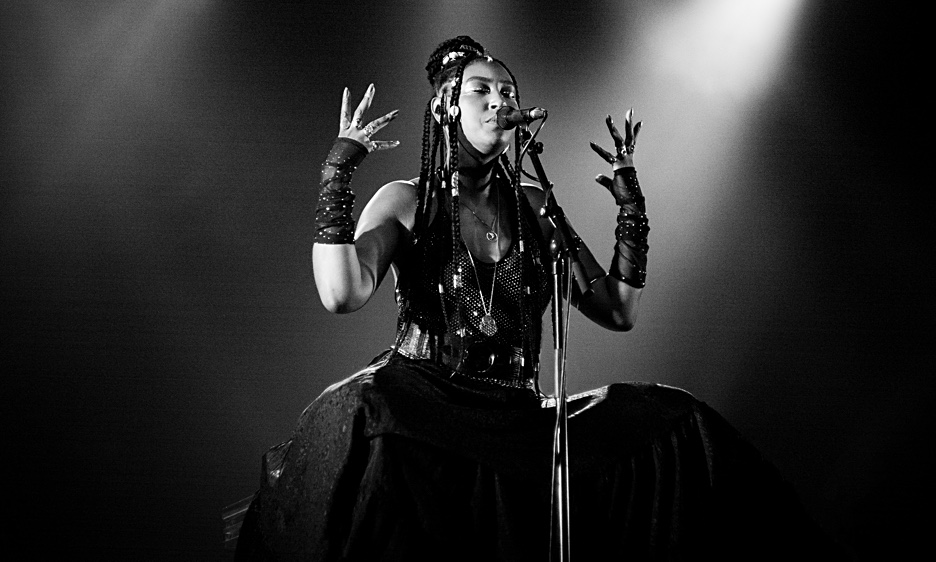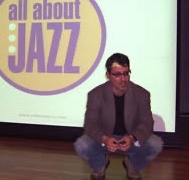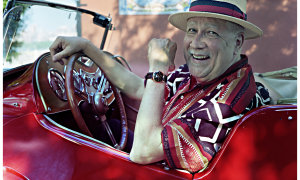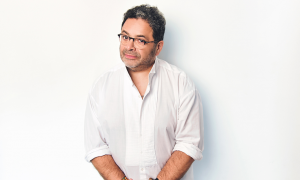Home » Jazz Articles » Inside The Interview » Dominique Fils-Aimé: Jazz as Freedom, Healing, and Connection
Dominique Fils-Aimé: Jazz as Freedom, Healing, and Connection

Courtesy Cecilia Baguerre Martinez
Freedom [is] what I’m hoping listeners are inspired to seek for themselves… jazz reminds us to seek freedom in all its forms.
—Dominique Fils-Aimé
When asked what she hopes people hear when they call her music "jazz," she responds immediately: "Freedom." Shortly after, she emphasizes again: "Freedom. It's the number one... that's what I'm hoping listeners are inspired to seek for themselves. I believe jazz resonates with us in a way that reminds us to pursue freedom in all its forms."
Fils-Aimé did not come to music by following a technical checklist. Before pursuing music as a career, she worked in psychological support for families, and the idea of music as a form of care remains central. She describes her creative process as something that starts with an impulse and then transitions into a meditative state—repetition and breath opening a pathway to meaning. "There is definitely a meditative aspect to even the creation process... there's always this notion of repetition... similar to breathwork," she explains. "It always begins with just a random impulse... and then from that point, it's as if I begin a meditative process that can last for hours."
Two recent touchstones exemplify that blend of rigor and receptivity. Our Roots Run Deep (Ensoul Records, 2023) portrays growth through an ecological perspective. "The whole album itself and this song specifically were inspired by nature... the color green is associated with the heart chakra... I'm being a little more open with my heart and sharing the messages and the lessons that I keep learning from my plants," she says. From there, she extends the metaphor below ground: "All the roots are actually connected... with the older ones feeding the younger ones. This felt like a clear metaphor... our ancestors are also feeding us... We are all connected, even if we can't see it with our eyes the same way." The takeaway is patient and practical: "Even if there is a tiny little leaf, we cannot expect to be a tree tomorrow."
Her single "Keep On Shining," created with producer/keyboardist JaRon Marshall, carries the same gentle insistence. "There is definitely the idea of mantras... I feel like it's similar to water... I want it to be something soothing and uplifting. Part of the messages I want to leave behind in my music is for people to allow themselves to shine their full light," she says. The song also holds space for loss and continuity: "Just like the people who leave us physically, I feel their light remains through their actions, words, and every memory we hold of them."
Fils-Aimé's perspective on jazz is closely tied to her performance style. "The studio has a very intimate setting... It's more about me wanting to share something with people, so it's me giving to people, and I feel like a live show is us creating together—from me, the band, the choir, to the energy of the people who are present," she explains. That is why she is drawn to capturing concerts as they happen, not as replicas: "There's something quite magical about... 'imperfections,' which actually just become humanity being present... We know it's only gonna happen once."
In venues like SFJAZZ's Joe Henderson Lab, that philosophy transforms the room into a collaborator. Instead of trying to replicate every stacked vocal from her albums alone, she spreads those patterns throughout the audience and the band. "Instead of layering my voice excessively, I let the audience participate. They are the ones who play some of the repetitive loops found on the albums... they make the music better because they make it their own," she says. The approach is simple but effective: listeners don't just receive the music; they help carry it.
Technology subtly appears and always enhances the feel. "There is a bit of looping because I now have a looper, but it's very sparse, allowing more room for the musicians to contribute. And even the sound man is a musician... he creates atmospheres and delays... which makes the show another dimension altogether." That team includes Etienne Miousse Olivier (guitar), Danny Trudeau (bass), David Osei-Afrifa (keyboards), and Harvey Bien Aimee (drums) —players who can shift from whisper-like textures to a deep groove without losing the thread.
Even when set to a tune, the music does not stay still. "Often, before stepping on stage, we'll say, 'Okay, I want everyone to do something they've never done before...' It keeps us on our toes... we have to stay in sync so we can keep up," she says. The result isn't randomness; it's responsiveness—a band vocabulary flexible enough to let a reharmonized vamp, a new call-and-response cadence, or a sudden shift in dynamics reframe a familiar song without breaking the conversation.
Her artistic lineage resembles a constellation more than a single path: Nina Simone and Billie Holiday for their honesty and vocal richness; B.B. King's guitar Lucille for that deep blues cry; Erykah Badu and Bob Marley for their soulful feel; and the layered harmony urgency of System of a Down. The point, she suggests, is not about belonging to a category; it is about the right fit. "When I started making music, I was just creating whatever felt right... It sounds good to me. That's what it's going to be."
That ear-first approach explains why her shows often leave rooms feeling lighter than before. The audience-driven loops turn listeners into active participants; the band's agile pocket allows her voice to ride atop a sparse and focused arrangement; the sound designer adds gestures with depth, making space itself feel musical. And the texts—whether "Our Roots Run Deep" or "Keep On Shining"—offer simple, lasting messages: be patient with your growth, and keep the light on for those you love. The overall effect is not a lecture on healing and community; it is the experience of both, happening in real time.
For readers discovering Fils-Aimé at a concert or years before the next one, the live album Live at the Montreal International Jazz Festival (Ensoul Records, 2025) functions as a compass, not a summary. It is a record of a moment that "will never be the same again," a sketch of how she treats presence as the point and "imperfections" as the human fingerprint that lets a song breathe.
And for anyone who approaches jazz with equal parts curiosity and care, Fils-Aimé offers a compelling vision of what the music can be today. Freedom, in her hands, is not just a slogan; it is clearly built into her approach—using audience loops that democratize the texture, trusting improvisation to reveal what truly matters, and crafting strong songs that move like mantras through the body. If you heard her live, you likely felt it in the room; if you are listening at home, you can still sense it in her choices. Either way, the invitation remains: "Freedom."
Tags
Interview
Dominique Fils-Aimé
Steven Roby
United States
California
san francisco
Dominique Fils-Aimé =
SFJAZZ
JaRon Marshall
Étienne Miousse
Danny Trudeau
David Osei-Afrifa
Harvey Bien-Aimée
Nina Simone
Billie Holiday
B.B. King
Erykah Badu
bob marley
PREVIOUS / NEXT
Dominique Fils-Aimé Concerts
Support All About Jazz
 All About Jazz has been a pillar of jazz since 1995, championing it as an art form and, more importantly, supporting the musicians who make it. Our enduring commitment has made "AAJ" one of the most culturally important websites of its kind, read by hundreds of thousands of fans, musicians and industry figures every month.
All About Jazz has been a pillar of jazz since 1995, championing it as an art form and, more importantly, supporting the musicians who make it. Our enduring commitment has made "AAJ" one of the most culturally important websites of its kind, read by hundreds of thousands of fans, musicians and industry figures every month.

























